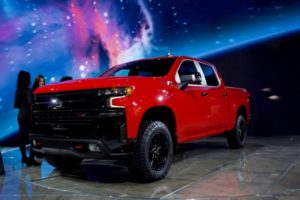
The most important announcements from the Detroit Auto Show were new pickup trucks from Ford, Chevy and Ram.
All three companies struggled to shift significant amounts of trucks in the tail end of the recession, but that helped breed a more competitive, more efficient breed of truck for consumers. Now, with gas prices remaining low and consumers increasingly demanding bigger cars, it’s no shock that pickup truck sales are growing despite stagnation in other market segments.
Together, the Ford F-Series, the Chevy Silverado lineup and the Ram pickup are the first-, second- and third-best selling passenger vehicles in the U.S., respectively. Combined, they accounted for 1,983,171 auto sales in 2017. And now that all-new version of the Ram 1500 and Silverado have bowed at Detroit, analysts are expecting even bigger sales for 2018.
“It’s going to be an important truck year,” Efraim Levy, Senior Analyst at CFRA, told CNBC. “That’s what I want to get across.”
That’s good news for the folks in Detroit, as Brian Johnson, an analyst from Barclays, pointed out in a note. The truck market, he said, is the “most profitable category for the Big 3” automakers.
It’s not just full-size trucks that made waves at this year’s North American International Auto Show. While Chevy and Ram focused on that market, Ford was busy unveiling a new entry into the midsize pickup truck market — the Ranger.
What used to be a low-volume segment, mostly composed of work trucks, has grown significantly in the past few years. Johnson says GM’s 2014 reentry into the market has proven that there’s a “viable, profitable market for a truck smaller than the [half-ton] truck that would not unduly cannibalize the larger truck category.”
Midsize trucks have found favor with workforces and companies ditching their bigger, half-ton trucks. They’re also a more fuel-efficient and cheaper way for people who to enter the pickup truck market.
It doesn’t hurt that they’re easier to park yet remain extraordinarily capable. That is why Ford is pitching the Ranger at young buyers who like to escape the city on the weekends seeking the outdoors.


